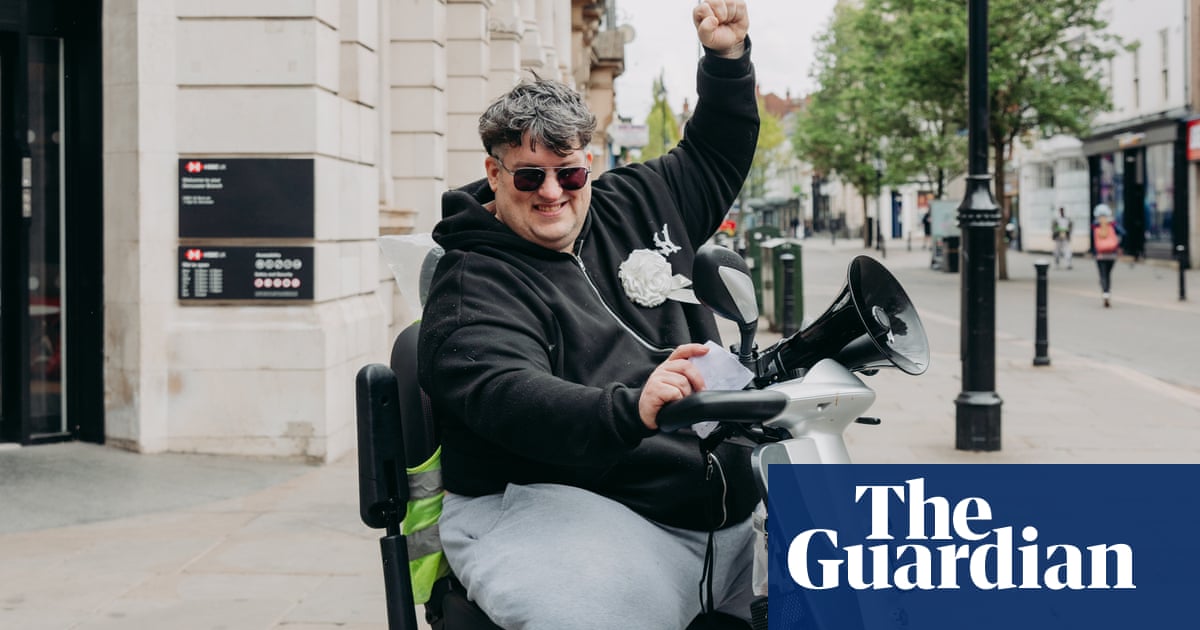“You can’t fix the system with the same hands that broke it,” Richie Vallance shouted through a megaphone from his mobility scooter. “Let’s makeDoncasterDoncaster again,” he yelled at passersby in the city centre, who mostly politely ignored him.
Vallance is standing as an independent candidate for mayor in the local elections on 1 May, when all 55 seats on the city’s council will also be up for grabs. The small South Yorkshire city is a key battleground that will be a test of Labour’s resilience in the face of rising public support forReform UK.
Nigel Farage’s party is surging ahead in the polls and in Doncaster there is a good chance it will wrestle control fromLabour, which has been in power for nearly 50 years. Last month, a poll conducted by Electoral Calculus for the Telegraph found Reform was expected to win 32 of the council’s 55 seats.
“It’s a beautiful town, with so much potential,” said Vallance, who has some sympathies with Reform and previously explored standing for the party. “I was all about Brexit,” he said, “and we need to deal with the immigration problem in Doncaster.”
Immigration was on the minds of lots of people in the city centre on Wednesday, with some saying they felt it had had a negative impact on the city, particularly when it came to asylum seekers, of whom there are 688 housed in Doncaster, according to Home Office figures.
“I know they’ve got to be put somewhere but Doncaster has changed and it’s not for the better,” one man said.
This sentiment is exactly what Reform is hoping to harness, and why Farage paid a visit to the city at the start of April in support of Alexander Jones, the party’s mayoral candidate.
While there was also disgust among some Doncaster residents at the idea of voting for Reform, Labour was not popular either. Most people, in one way or another, pointed to what they felt was decline in the city, blaming the cash-strapped council.
It is something the current mayor, Labour’s Ros Jones, who has been in the directly elected post since 2013, is all too aware of, having battled under the weight of enormous budget cuts from central government.
She said: “I have made incredibly difficult decisions in terms of council services over the years of austerity, protecting frontline services and keeping council tax low, with Doncaster having the lowest council tax inYorkshire.”
Though Jones had some supporters on the streets of Doncaster – one couple said they were “not unhappy” with the council and called Farage a liar and a “mini-Trump” – she is also contending with the council’s reputation.
Near the start of her tenure, she pulled the local authority out of special measures after the tabloids called Doncaster the“worst council in Britain”, and the label seems to have stuck.
Labour could face a bigger brand-recognition problem in Doncaster as some of those out and about only vaguely recognised Keir Starmer’s name. This might be cheering news for Reform except Farage’s name did not necessarily ring bells either.
“Never heard of him,” said Shelly, who was out in the Frenchgate shopping centre with her friends Siobhan and Jade.
“Was he in the Celebrity jungle?” Jade asked. “He seemed all right but I wouldn’t know about his politics.”
Though they did not know Reform, the trio did broadly agree with the party’s policies on immigration. “We need to get back to British, not everybody else,” Siobhan said. “We shouldn’t be fetching migrants when we can’t even look after our own.”
Shelly said: “I daren’t say owt because it sounds racist.”
They felt people coming to the UK were getting better treatment than those born here, particularly because they were put up in hotels and given homes without having to work.
The UK has a legal duty to house asylum seekers, and paid work is forbidden under asylum rules. The women said they were not against this, they just wanted to see British people better looked after.
“It’s a bleak future for the next generation,” Siobhan said.
The issue for all parties is likely to be getting voters to the polls. Most people the Guardian spoke to in Doncaster on Wednesday lunchtime said they did not vote and had not known there was a local election happening at all.
“I don’t do politics,” one man said. “Whoever’s the prime minister, good luck to them.”
Naomi Nache, from Romania, and Michael Yip, from Scunthorpe, moved to Doncaster when they started working in an Amazon warehouse. They have plans to leave for a bigger city, citing a lack of things to do in Doncaster, particularly on the “artistic side”.
Safety was a big issue for Nache, who said she felt afraid to go out in the city on her own. “It can be a bit scary. It doesn’t feel safe. I wouldn’t come to the town centre by myself,” she said.
Vallance has campaigned on public safety and tackling antisocial behaviour, knowing something about the subject himself having received a criminal conviction in 2016 for dressing up as the “Donny Klown” in an effort to attract attention to societal problems.
“I scared a lot of people and I’m really sorry about what I did. I went about it the wrong way,” Vallance said. “I took the mask off many years ago. Now I want to show who the real clowns are.”
